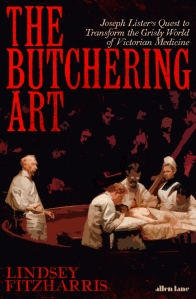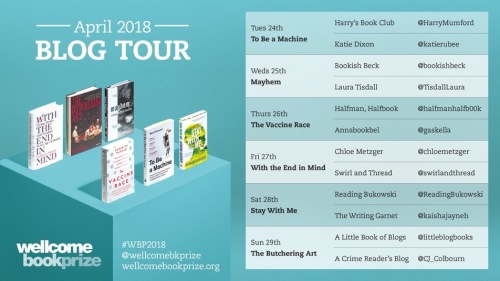 My final Wellcome Book Prize shortlist post is also part of the final day of the blog tour showcasing each book before the winner is announced tomorrow. ‘The Butchering Art: Joseph Lister’s Quest to Transform the Grisly World of Victorian Medicine’ by Lindsey Fitzharris is one of the titles I was particularly interested in reading when the longlist was announced in February. Although Lister is the main biographical subject of the book, ‘The Butchering Art’ also works as a more general narrative non-fiction account of the history of surgery in the mid 19th century.
My final Wellcome Book Prize shortlist post is also part of the final day of the blog tour showcasing each book before the winner is announced tomorrow. ‘The Butchering Art: Joseph Lister’s Quest to Transform the Grisly World of Victorian Medicine’ by Lindsey Fitzharris is one of the titles I was particularly interested in reading when the longlist was announced in February. Although Lister is the main biographical subject of the book, ‘The Butchering Art’ also works as a more general narrative non-fiction account of the history of surgery in the mid 19th century.
It’s fair to say that the title alone is a pretty clear indicator that ‘The Butchering Art’ isn’t for the fainthearted and I can’t think of another book that evokes the stink of Victorian London and its hospitals quite so vividly as this one does. Indeed, many doctors in training at the time found the sights and smells of surgery overwhelming and, as Fitzharris dryly notes, “The profession was not for everyone” (p. 39). The book opens with a detailed account of the first amputation carried out under anaesthetic in 1846 at University College London by Robert Liston in just 28 seconds, a procedure witnessed by Lister during his studies. The minority of patients who survived invasive surgery at the time would usually succumb to postoperative infections instead. The causes of these complications were not well understood at a time when “bad air” or miasma was widely believed to spread disease and knives and other operating tools were rarely cleaned between patients.
Lister spent much of his early career in Edinburgh as an assistant to Dr James Syme, a professor of clinical surgery whose daughter, Agnes, later became Lister’s wife. His use of carbolic acid to prevent wound infection resulted in a dramatic reduction in mortality rates during and after surgery as well as significant improvement in long-term outcomes for patients. However, persuading other surgeons to adopt his methods as standard practice proved to be far more difficult. It wasn’t until Lister successfully operated on Queen Victoria to remove an abscess that his work started to be taken more seriously, and several hospitals in the United States still banned doctors from using Lister’s techniques well into the late 19th century because hand-washing was seen as an unnecessary distraction.
Many people will be aware of Lister’s name (through Listerine mouthwash, if nothing else) without knowing much about the man himself. Lister’s Quaker background and aversion to confrontation may not fit the stereotypical image of an egotistical surgeon, but his dogged pursuit of the real causes of infection and his efforts to educate others about how to prevent them in the face of so much opposition among his peers makes him a hero for common sense introverts everywhere. Lister doesn’t appear to have revelled in the gore of surgery as much as Fitzharris does in her writing, but her thrilling and fascinating book pays tribute to a pioneering surgeon who truly changed modern medicine forever. Many thanks to Midas PR for sending me a review copy of ‘The Butchering Art’.

Yesterday, Rebecca and I went to a talk with five of the shortlisted authors in conversation with Lisa O’Kelly at the Wellcome Collection in London (Mark O’Connell wasn’t there unfortunately). Ayobami Adebayo gave the audience an insight into sickle cell disease, Sigrid Rausing spoke about how society hasn’t decided how we should view and treat addiction while Lindsey Fitzharris described her book as “a love story between science and medicine” and confirmed that there is a film adaptation in the works. Kathryn Mannix has now retired as a palliative care consultant but is continuing to raise awareness about the issues raised in her book about what happens during a peaceful death while Meredith Wadman’s latest project about disputes over funding research that might lead to gun control sounds particularly interesting. The varied group discussion with questions from the audience touched upon a wide range of issues including medical misinformation, patient advocacy, homeopathy and ethics. I believe there are still a few tickets left for another event with the shortlisted authors at Cecil Sharp House in Camden at 3pm today if you are at a loose end in north London this afternoon, or you can read Rebecca’s account of yesterday’s event here.
Some of you will have already heard that our Wellcome Book Prize shadow panel winner is To Be a Machine by Mark O’Connell, a book which we all felt explores what it means to be human in surprising and innovative ways. The concept of transhumanism may not be widely known or understood yet, but O’Connell’s engaging and fascinating book explains the significance of the movement and its possible implications both for the distant future and how we live now.
The official winner of the Wellcome Book Prize will be announced at a ceremony at the Wellcome Library tomorrow. Good luck to all of the shortlisted authors!





Great review! I’m glad I wasn’t hearing things and you also heard that there is going to be a film of The Butchering Art. How random! Did you get your book signed?
LikeLike
Yes, I got it signed 🙂 I’m intrigued to see how the book will be adapted for the screen. See you tomorrow!
LikeLike
I know Lister’s name from medical school, but precious little about his life outside of work. This is definitely a book I need to track down and read. Thank you for your review.
LikeLike
Hope you enjoy it!
LikeLike
Pingback: My Favourite Reviews of the Week | 4th May – BookBum
Pingback: Heart: A History by Sandeep Jauhar | A Little Blog of Books